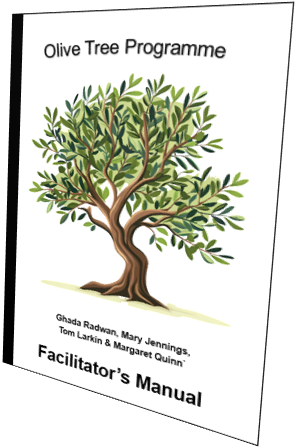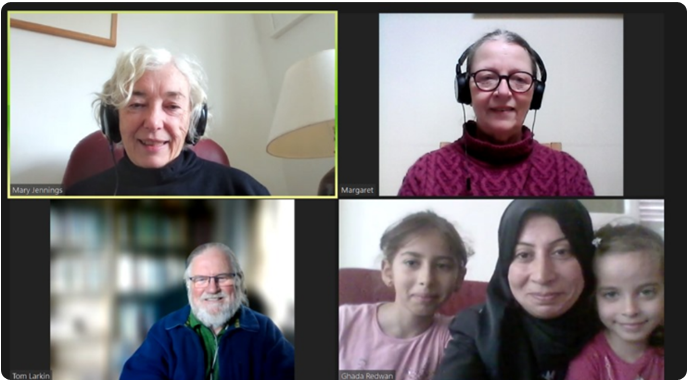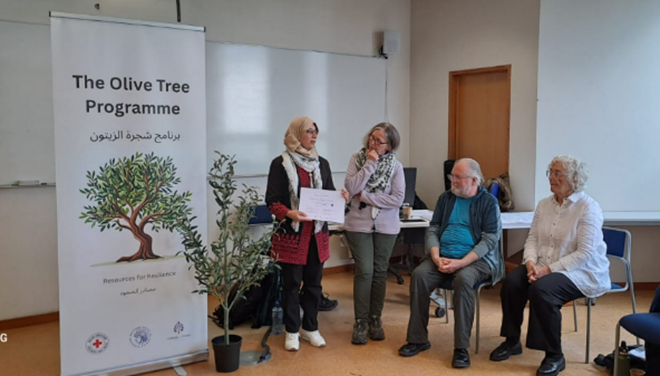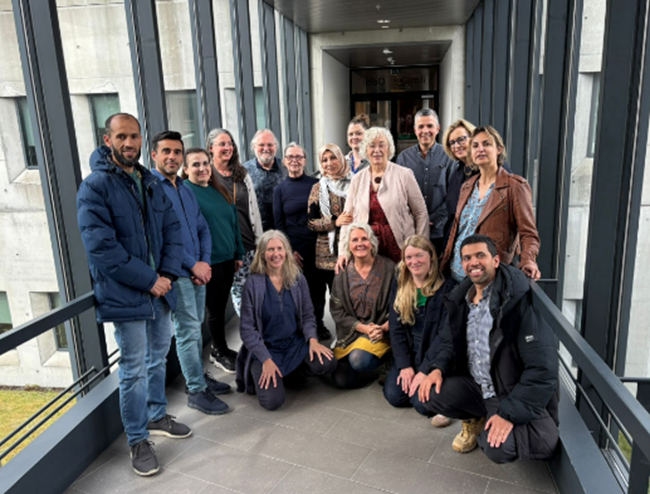by Margaret Quinn
Where to begin……
The story of how we found ourselves leading a training course for people who would facilitate a programme designed to promote resilience among refugees and asylum seekers in Iceland begins in another place and another time.
 In 2011, Mary Jennings and Gerry Conway were invited to travel to Gaza to work with the Palestine Trauma Centre (PTC). The initiative was sponsored by the Quaker Community in Galway and the UK and had the aim of teaching basic Focusing skills to the personnel of PTC. In 2013, they returned to Gaza, this time accompanied by Rene Veugelers, to explore ways of using Focusing with children. The team then created a twelve session programme for community groups which would be offered by PTC. Delivery of that programme was led by Ghada Radwan, who translated the programme into Arabic and worked to ensure that it was culturally appropriate and included multi-modal approaches – using art and drama for example.
In 2011, Mary Jennings and Gerry Conway were invited to travel to Gaza to work with the Palestine Trauma Centre (PTC). The initiative was sponsored by the Quaker Community in Galway and the UK and had the aim of teaching basic Focusing skills to the personnel of PTC. In 2013, they returned to Gaza, this time accompanied by Rene Veugelers, to explore ways of using Focusing with children. The team then created a twelve session programme for community groups which would be offered by PTC. Delivery of that programme was led by Ghada Radwan, who translated the programme into Arabic and worked to ensure that it was culturally appropriate and included multi-modal approaches – using art and drama for example.
Over time, Ghada developed an interest in deepening her Focusing practice and becoming a Focusing Trainer herself. Her great desire was to share Focusing with others in Gaza, particularly those who could bring Focusing to their work as psychologists, teachers etc. Ultimately, she hoped to train Focusing trainers in Gaza. Mary undertook to support Ghada through her initial training process and became her primary mentor. It was during this time that Ghada connected with the newly emerging Irish Focusing Network. Some of you will have met her during online courses she joined during the pandemic.
Having completed her Focusing training, Ghada invited Mary, Tom Larkin and myself to support her in preparing a training programme to expand her work in Gaza. When we had completed the first part of this work, Ghada began to work with a group of psychologists. It was interesting to hear that they found the Focusing approach fresh and different. Many wanted to continue their training. We were beginning work on the second phase of that project when war broke out.
There are so many ways that work can be disrupted, or projects derailed – illness, relocation, personal circumstances. What actually happened was beyond anything we could have imagined. Not only did the work stop, but, for long stretches of time we lost contact with Ghada and were left wondering if we would ever hear from her again. We worried for Ghada and her family, we felt helpless to offer support other than the messages we sent. Destruction of the communication infrastructure in Gaza meant that very often those messages were met with silence. We would wait, sometimes for weeks, for any response which would let us know that they were still alive.
As the months passed and we watched the horror unfold, Ghada and her family were displaced several times, two of her nieces died when a bomb targeted a house close to where they were sheltering, food and water became more difficult to find and communication remained sporadic. Finally, Ghada, Mohammed, Eilia and Elite were displaced to a tent in Rafah.
Our Focusing project was stymied, so Ghada turned her attention to the other needs she saw around her. It came as no surprise to us to discover, in occasional messages, that she was supporting mothers in Rafah to access food and supplies for their babies. Accessing support from “Challenge to Change” she was able to help 50 families to keep their babies fed and clothed despite the awful circumstances. Above all, her energy was focused on keeping her daughters well and encouraging them to retain hope of a better future. She has told us that drawing on Focusing during this ordeal was a great support. As the assault on Rafah began, however, Ghada and Mohammed decided that, to protect their children, they had no option but to leave Gaza. The story of how this was achieved would take a novel and strain belief. Suffice it to say that the efforts of many friends and the brilliant co-ordination of efforts by Sigríður Þorgeirsdóttir, who works at the university of Iceland, and Donata Schoeller, who many of you know from her courses with the Focusing Institute, resulted in the family leaving Gaza on the day before the Rafah crossing closed for good – making departure impossible.
In Cairo, Ghada once again had access to the internet and I can still remember what it felt like to see her on Zoom during that first meeting. I remembered the story Ghada told us about the woman in Gaza who said “I am not waiting for death, I am seeking life.” This resilient little family despite having to leave behind home and family, sought to live meaningfully in this no-ones-land that was their time in Cairo.
This was when our shared project entered a new phase. Never one to waste time, or stint energy, Ghada wanted to offer some support to displaced Palestinians in Egypt. Our thinking was that we could best support them by creating a programme designed to reclaim or re-build resilience. The Olive Tree project was born.
While it was difficult for Mary, Tom and me to imagine how this could be organised, Ghada was already in touch with groups like “Challenge to Change” (a Swiss charity) and exploring ways to offer the programme to online to Palestinians in Egypt, Lebanon and Jordan. She’s not a woman to let the grass grow under her feet. We went back to our planning meetings and hammered out an approach which blended Focusing with Psychological first aid models, mindfulness practices and insights from neuroscientific research.
While it was difficult for Mary, Tom and me to imagine how this could be organised, Ghada was already in touch with groups like “Challenge to Change” (a Swiss charity) and exploring ways to offer the programme to online to Palestinians in Egypt, Lebanon and Jordan. She’s not a woman to let the grass grow under her feet. We went back to our planning meetings and hammered out an approach which blended Focusing with Psychological first aid models, mindfulness practices and insights from neuroscientific research.
As the work continued, it became clear that remaining in Egypt long term might not be possible and, thankfully, Ghada’s friends in Iceland again came to the rescue, supporting her application to study at the University of Iceland.
So what now for the Olive Tree Programme? Online offerings were a possibility, but how to do it? The programme was coming together and we believed it would be useful, but, as Gendlin might put it: “What’s possible now?”
We reckoned without the creativity and “go-for-it-ness” of Ghada, Sigríður and Donata as well as the generosity of the Icelandic government and “Challenge to Change”. An application for funding was successful and before we knew it, Ghada was asking us if we could be available to travel to Iceland to train a group of facilitators to deliver the Olive Tree Programme to Arabic speaking refugees and asylum seekers there! Who could say no?
In late May, as we took our seats on the plane, Mary turned to me and observed – in a tone of complete astonishment – “We’re going to Iceland!” There had been so many obstacles and challenges along the way. What had started out as “notes for Ghada” had to become a manual which would be accessible to people who knew little or nothing about Focusing – it took months! This new iteration of the programme also involved adding a layer of facilitator training – another manual for us - no small task in itself. Then there was the organisational end – travel arrangements, venue and the rest – all brilliantly handled by Una Þorláksdóttir. The decision to proceed was not without its worries either. We were setting out to offer training to a group we had never met, about whom we knew very little except that several of them worked with Arabic speakers through the Red Cross or Municipal authorities in Iceland. A small number of the group were Icelandic and were familiar with Focusing or TAE.
We need not have worried. From the moment of our arrival, our Icelandic friends went out of their way to make us welcome and to ensure we had every support for the work. Ghada, Mohommed and the girls welcomed us like family and it was wonderful to have an opportunity to spend time with them. We are grateful to Sigríður, Una, Elsa and Gugga for all they did to support this project. And then there was the group of trainees….. welcoming, interested, engaged – all we could have hoped for. The six day training was intense and demanding. They met every challenge and working on the programme became one of those wonderful experiences of collaborative effort.
We are currently in conversation with this group as they prepare to offer the Olive Tree Programme to their clients. Translation into Arabic and (we hope) Icelandic is underway, which will make this easier for the facilitators and more accessible for those who can benefit most. What the future holds for the programme is an open question, but our experience over the past several years, particularly the most recent, have left me thinking that anything could happen – and feeling open to that. For now, it is enough that this lovely group of people will carry the programme forward in Iceland while we explore how it might make an impact in Ireland and/or elsewhere.
Reflecting on the entire experience, I am, above all, grateful that this project offered a way to do something useful at a time when – perhaps like many of you – I felt utterly helpless in the face of the daily images from Gaza. That the situation continues to worsen by the day still shocks and horrifies me. Ghada remains deeply concerned for her family members who are still in Gaza – suffering the fear and privation we see on our screens every day. This project is, for me, an attempt to light a small, frail light in an encircling darkness and I am deeply grateful for that. As I am grateful for the opportunity to work with Ghada, whose resilience, determination and generosity continually leaves me awestruck – and inspired.

From left: Ghada Radwan, Margaret Quinn, Tom Larkin, Mary Jennings.

In front, from left: Guðrún Arnalds, Helga Arnalds, Guðbjörg Jóhannesdóttir, Osama
Mubarak Al Hijazy,
Standing, left to right: Ahmad Seddeeq, Mohammed Raheem, Reema Abdalhakeem, Kerryn
McMurdo, Tom Larkin, Margaret Quinn, Ghada Radwan, Elsa Haraldsdóttir, Mary Jennings,
Salah Kareem Mahmoud, Sigríður Þorgeirsdóttir, Soumia Islame
Here is a wonderful documentary on our project




